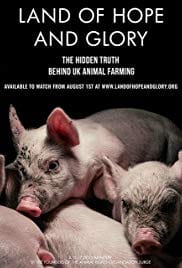Is it the end of the road for livestock farming?
Production of animal products is responsible for over three quarters of agricultural land usage, a major emitter of greenhouse gases and a key driver of deforestation

Conversations surrounding human contributions to global warming are naturally fraught with confusion due to the sheer enormity and complexity of the issue, but can also be twisted by those whose proximal goals conflict with the changes necessary to address it.
One such point of confusion frequently used to mask the true consequences of animal agriculture is its impact on the emissions of greenhouse gases (GHGs) including methane – an often overlooked but intensely important contributor to global warming. A recent example of this was seen during an exchange between animal rights activist Ed Winters, ‘Earthling Ed’, and Phil Stocker, CEO of the National Sheep Association, on Victoria Derbyshire’s BBC 2 show. During the segment, Mr. Stocker noted the longstanding criticism of ruminant animals including cattle and sheep regarding their production of methane as a by-product of digestion. However, he then proceeded to dismiss it, claiming this production is simply “part of a natural gaseous cycle” that the Earth has “adapted to cope with” over thousands of years. This was exemplified again during a conversation on The Big Questions, also featuring Ed, when a butcher speaking in defence of farming practices skipped over the issue of methane emission entirely while praising the carbon-storing properties of the grasslands that constitute much of the land used in UK agriculture. The labelling of such emissions from livestock as ‘natural’ and therefore not worthy of concern, or neglecting to mention them at all, is misguided at best, if not nefarious when the true implications considered.
Greenhouse gases often fall under the same rubric in debates concerning environmental issues, but are anything but similar in their effects. Methane, it is true, is shorter-lived than CO2 and makes up a comparative minority of total greenhouse gas emissions, clocking in at 16% of global emissions compared to 76% from CO2, as reported by the Intergovernmental Panel on Climate Change (IPCC) in 2014. However, in terms of their global warming potential (a measure of the relative capacity of a gas to absorb radiation emitted from the Earth’s surface, preventing it from escaping and thus warming the planet) methane outscores CO2 by a factor of up to twenty eight to one. Consider this alongside the fact that agriculture is consistently ranked as one of the largest sectors (if not the largest sector) in terms of its contribution to methane emissions, and the severity of the issue starts to become apparent.
Animal agriculture contributes to climate change in numerous ways, but among the most notable is its status as a leading cause of deforestation. This clearing of rich and diverse areas of plant life to make way for land on which cattle can graze, and where food can be grown and fed to livestock, is perhaps most famed for its devastation of the Amazon rainforest. Deforestation in this region hit its highest rate in a decade last year, with nearly 8,000 square kilometres being cleared. Cattle ranching is now considered to be its most significant cause, and nearly 80% of deforested areas in Brazil (which contains approximately 60% of the rainforest) are currently used for pasture. Whilst this is a potent example of the motivations behind these activities and of the enormous proportions of land used for nothing but raising and feeding livestock, this is hardly an extreme example when considered globally. 77% of the world’s agricultural land is currently used for livestock farming purposes including growing crops for animal feed, while in the UK the production of animal-based products makes up 85% of the land footprint.

This issue of land use really takes us to the heart of the issue and highlights the hypocrisy and near-sightedness of skimming over the negative consequences of animal agriculture including methane emissions, and of characterising the side effects of our massively overinflated livestock trade as something natural. It is true that CO2 emissions exceed those of methane, but its removal from the atmosphere depends directly on processes which are inherently compromised by the mass raising of livestock. This occurs via carbon sequestration: the process by which CO2 is removed from the atmosphere and stored by forests, grasslands and other such areas, with forests having the advantage of greater above-ground biomass per area of earth, meaning they may serve as better long-term carbon sinks than grasslands. A recent study from Oxford university concluded that excluding animal products from one’s diet can reduce emissions associated with their food’s production by 49%, and that the land required for food production could be reduced by 76% if such a diet was adopted globally. Alongside this, a recent Nature paper which was considered the most comprehensive study to date of the environmental consequences of food production recommended drastic decreases in our consumption of meat, dairy and eggs, accompanied by increased consumption of plant-derived foods such as beans, nuts and seeds to counteract drivers of climate change.
Climate scientists recently warned that we have around twelve years to backpedal our impact to cap the ongoing temperature rise to 1.5°C – the maximum that can be tolerated to avoid the most catastrophic projections of continued warming. Even assuming this target is met, however, the forecasts are grim. The World Health Organisation has estimated a rise of 95,000 child deaths per year due to malnutrition, and 60,000 extra deaths from malaria worldwide, while upwards of 100 million people could be plunged into extreme poverty according to the IPCC. Reports from these organisations and others including the Tyndall Centre for Climate Change Research further estimate that up to 150 million people may be affected by drastic sea level rises during the coming century. Ocean acidification due to dissolved CO2 could also have devastating effects, with a predicted 70-90% decline in existing coral reefs – a major source of food and protection to people as well as a host of diverse marine life.
Doing everything we can to reduce our current impact on the planet is imperative to minimise these consequences to as large a degree as possible, and reducing our reliance on animal agriculture is among the most logical, not to mention ethical, places to start. And in case the information above isn’t enough of an incentive, the benefits of making such changes are by no means limited to counteracting global warming. Increased food availability resulting from the redistribution of crops to humans instead of livestock, which results in a much lower yield of food production, could mean an end to world hunger given a permitting political climate. Additionally, a host of powerful medicines may remain to be discovered in the diminishing rainforest, supplementing the current list including Quinine, a medication used to treat malaria, and Vincristine and Vinblastine – compounds used in cancer treatments to prevent cells from dividing.
One thing is for sure – there is nothing ‘natural’ about the levels of emissions currently generated by raising livestock. Rather, it is one of the main factors endangering everything that is.








